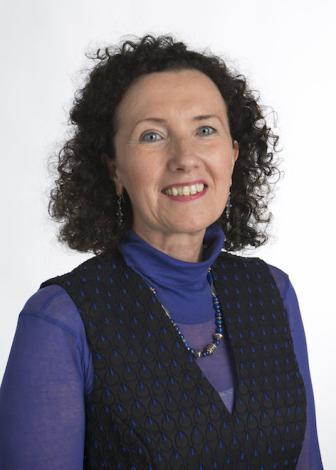Poet
Mary Noonan

Mary Noonan
(United Kingdom of Great Britain and Northern Ireland, 1958)
© Tomás Tyner
Biography
When Dedalus Press published Mary Noonan’s first collection of poems The Fado House in 2012, an arrestingly dramatic and original voice arrived in Irish poetry. The
book was shortlisted for both the Seamus Heaney Prize for a First Collection 2013 and The Strong/Shine Award 2013. Since then Noonan’s reputation has grown steadily. Her new collection Stone Girl, due from Dedalus early in 2019, mines her themes of family, travel, love and art with a renewed strength and confidence as the shadows darken and language intensifies.
Noonan was born in London, but grew up in Cork. She completed an MA in English at UCC, and then worked for a number of years as a translator in Brussels. She returned to London, where she completed a PhD in French drama at Royal Holloway, University of London. She lectures in French literature at University College Cork.
slice the char-grilled silk pocket,
a delicacy in Ribarsko Ostrvo, place it
in my mouth, snug with the flesh of my cheek.
We’re waltzing cheek-to-cheek now, Perch,
I’m tasting the sludgy intimacy of your face
Every Noonan poem is a true performer which begs to be read aloud for its sonic delights as well as its strange and original visual tapestry. Her food poems in particular are suffused with a magical eroticism. In the poem The Invader, while a lover is like "A Walrus on dry land… bulky and clumsy", his shopping lists written in tiny delicate letters prefigure his creation of impossibly delicate gastronomic delights:
Bright orange wings – Vanessa Atalanta,
scintilla astray in the Mojave desert –
were once tomatoes. Bread you shaved
to be thin as the collar-bone of a hare,
worn thin by the lapping of water,
or lace, woven in a beguinage, from
threads almost invisible.
This is a poem to break your heart because Noonan's poems are, above all, poems of the heart. There are several fine intense love poems in both collections which run alongside poems of great filial tenderness. The parents who visit their young daughter in Rue St. Paul are also like walruses on dry land with their "unfashionable clothes and poor haircuts" – their "blood was of the rural parishes of county Cork", awkward and ill at ease, her menopausal mother walks in search of the wild cats in the quartier while her father scrutinizes the racing pages. "I hope I was kind to them, but I doubt it."
The parents, true revenants, return again and again in the poetry, sometimes old and ill, often helpless and most spectacularly in the poem, Fractured when the poet is literally possessed by the spirit of the dead parent:
I managed it,
my finest trick: I became you
yes, I pulled off the skin-
changing thing by flinging
myself up in the air and banging
back down on my left
arm: banjaxed. I was
a barmy, splintered Boney
in a black sling as they drove me
to your anniversary mass
To love is to suffer and Noonan’s Calvary, one of the most striking poems in her forthcoming collection, and published here for the first time, is a terrific up-to-date and Irish version of the Old English poem 'The Dream of the Rood' transplanted to "mid-summer Monaghan" where a dead chestnut is condemned to stand "in full view/of his children, while the blind universe/ whirls its catherine wheels round him".
Noonan writes travel poems ranging through France, Portugal, Germany, The Middle East and India but ultimately it is Paris and the French poets who really haunt Noonan’s world, her perfectly visualised home city of Cork. The poet haunting the graveyard in 'Flânerie of the Beaver' could be a metaphor for Noonan herself so preoccupied is she with the bones of the dead. Paris and Cork are always haunting each other, especially in the surreal and funny 'The Nun’s Wall', where a row of "grinning gap-toothed" nuns’ faces appear on the top of a convent wall on Richmond hill, like French gothic chimeras.
The epigraph to Nerval’s 'Golden Verses' is a quote from Pythagoras, "All things feel". This would be a good epigraph for any Noonan poem where every sense is on fire and a perch might nestle ‘snug’ in the cheek of his devourer. In Eduardo’s, where a restaurant is made from "the thin/arms of a tree", Noonan, with extraordinary sensual feeling and true negative capability, mingles with the waiter and tropical fish, diving
…into a Douro red and the flashy fish
and the silver-haired gentleman and I swim
into and out of each other. He slices pink duck-
breast and flambés raspberries in vodka
and the thin brown arms of the tree squeeze
us closer and the chalky fringe of the low ceiling
blanches the top of my head.
© Martina Evans
BIBLIOGRAPHYThe Fado House Dublin Dedalus Press, 2012
Father Bonnefant Press, 2015
Flânerie of the Beaver Bonnefant Press, 2017
Stone Girl Dublin Dedalus Press, 2019
LINKS
MORE POEMS
The Manchester Review
And Other Poems
REVIEWS OF THE FADO HOUSE
David Cooke
Big City Lit
ACADEMIC WORK
UCC profile
Poems
Poems of Mary Noonan
Sponsors





Partners
LantarenVenster – Verhalenhuis Belvédère

